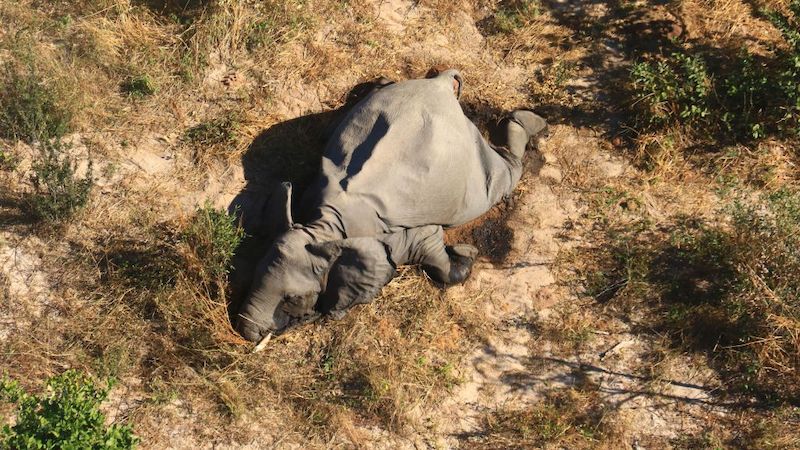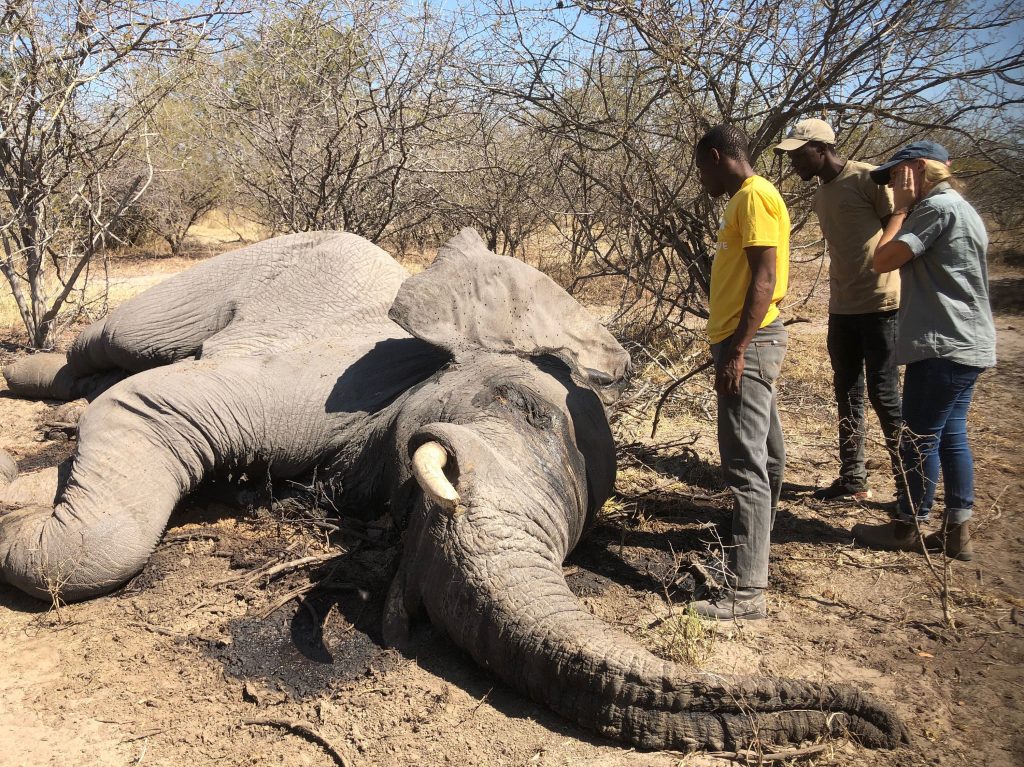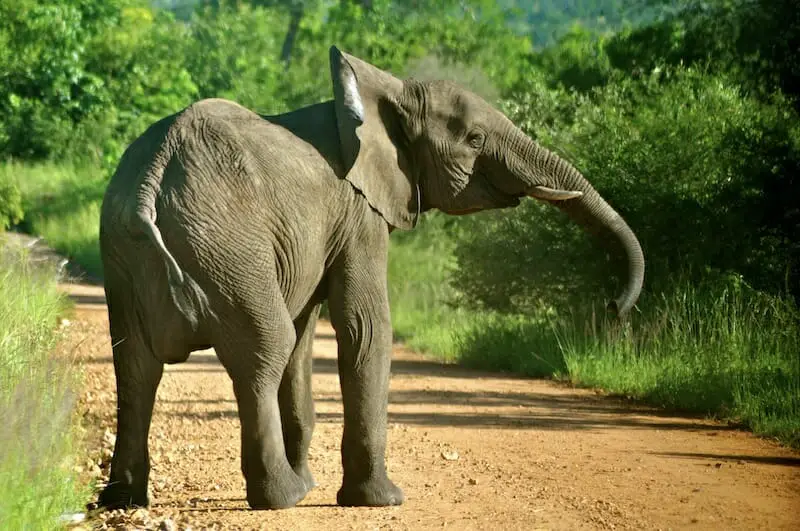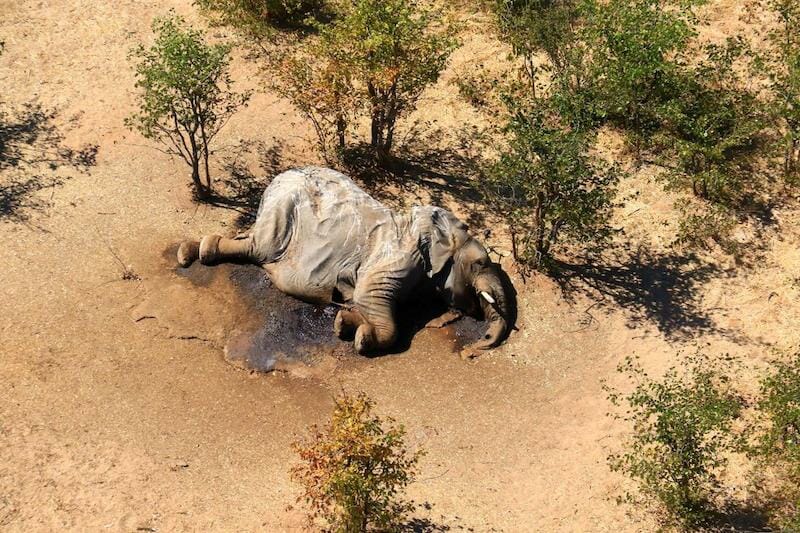Elephants in Botswana
Over the past month and a half or so, we’ve been keeping a close eye on an ongoing mystery that has been unfolding in Botswana. Back in late June, it was revealed that more than 300 elephants had perished under mysterious circumstances, setting off alarms amongst conservationists around the world.
Since then, there has been a lot of speculation as to what the cause of death for these animals could potentially be, but with few real answers being offered. Now, we’re getting close to solving this case, as officials have revealed a bit more information from the field, although unanswered questions do remain.
The Global Pandemic Slows Response
When rangers and wildlife researchers launched an aerial survey of the Okavango Delta region in Botswana back in early June, they thought that it would be a fairly routine procedure. After all, with a global pandemic taking place, there were few travelers who were wandering out into this remote corner of the African country.
Thanks to the coronavirus lockdowns, no one had been out to take stock of what was happening in the wild for several months, although the expectation was that not much had changed over that time.
But when the rangers began spotting numerous dead elephants on the ground, they quickly realized that something was seriously wrong. From the air, it was impossible to tell exactly what had happened to the creatures, but it was clear that there was a mass die-off taking place.
Worse yet, whatever was killing the creatures wasn’t exactly clear, prompting concerns that a pandemic of a different kind would soon infect Botswana’s large elephant population.

Investigative Team Organized
It took them a while to organize a team that could investigate the situation on the ground. Eventually, however, a group of scientists and researchers were dispatched into the bush to see if they could find any answers.
Their goal was to locate as many of the elephant carcasses as possible in order to collect samples and other data from the dead animals. When that mission was accomplished, those samples were sent off to labs in Zimbabwe, South Africa, the U.K., and the U.S. to be examined.

What Could have Caused all these Elephants to Die?
While Botswanan officials and conservationists waited for the actual results, a number of possibilities for the deaths were quickly eliminated. For instance, it was clear that the elephants hadn’t been killed by poachers, as their tusks were left untouched.
Anthrax was also quickly ruled out, as there were no traces of the material to be found in the area or on the creatures themselves. The fear was that it could be some new virus that was spreading through the elephant population, although after further scouting throughout the region, that doesn’t seem likely to be the case either.
Was it a Natural or Man-Made Event?
So what exactly is the cause of so many elephant deaths in such a relatively small area and over a short period of time? According to reports, it now seems that they were killed by “naturally occurring toxins” that were most likely ingested. The exact toxins have yet to be identified, however, but speculation is that it is some kind of bacteria, possibly found within the local water supply.

Dormant Bacteria in the Soil to Blame?
Last year, heavy rains brought severe flooding to the Okavango Delta region for the first time in years. It is possible that those waters washed up some dormant bacteria that have been hiding in the soil for a long time. Considering that the mass die-off now seems to have stopped, it also seems likely that this toxin has gone dormant again.
Whether or not it will reappear remains anyone’s guess, but more flooding in the future could dredge it up to do more damage at a later date.
More Information Coming Soon
The final—and more detailed—report is still being compiled by the Botswanan government, so expect to hear more about this down the line. While this has been a troublesome development, it does seem like we’re edging closer to finding some answers.
Best of all, the main population of elephants in the area appears to be safe and healthy. And while the death of 300 elephants is disturbing, it won’t have much of an impact on Botswana’s population. The wild herds there are said to number more than 120,000, making it the largest in Africa.
- Gear Review: The Xero Scrambler Mid is an Ultralight Hiking Shoe for Spring - March 1, 2023
- Gear Review: Yeti Roadie 48 Wheeled Cooler - August 18, 2022
- Kristin Harila Continues Pursuit of 8000-Meter Speed Record - August 16, 2022

If it was a water borne toxin, such as cyanobacteria algae, there should be evidence of other animals fatalities in the area. Reading initial reports, this was not the case.
I am sceptical of these findings thus far.
Good point! To be fair, the waterborne explanation was speculation on my part. So far, we haven’t heard anything beyond that it appears to be a naturally occurring toxin. What that toxin is remains to be seen. But it would probably also impact other creatures as well, no?
Indeed. I cannot think of a species specific toxin; on the other hand, viruses obviously are. But I have no deep knowledge in that area.
Cow dip is poisonous to dogs and cats but not to cattle and goats
Very much of my thought, the if the water was contaminated why only elephants dying? Mind you remember what the sitting president said about these animals during those debates mmmh! Allow me to suspect foul play. The current government is fighting the former leadership and is doing so to everything even good policies and initiatives so I wouldn’t be surprised they kill elephants because they want to hurt the former. Yes the current would do that.
???That’s a huge one
Please.u mean they will kill animals to settle scores!I disagree
You mean they will kill elephants to settle the score as if they belong to the former? I don’t think so…
That is true. Other animals would have been affected as well. Good point
Your worry makes sense, but considering how much a single elephant consumes or drink in a single day, if a toxin is present in the ration, it might easily exceed the threshold to trigger an upset in the elephant’s system compared to the case of smaller abd less consuming animals. Toxins can be triggered effective beyond a certain minimum
I think the suggestion that it was a waterborne toxin has merit and possibly there have been other species fatalities. Smaller animals don’t drink as much as elephants and perhaps those fatalities would not have been as noticeable, and more easily disposed of in the normal food chain.
Has the last meal.been accounted for?? What is in their bellies?? Could be specific poisonous berries or the top 6 toxic plants??
It’s all bs someome is covering for the gov I think and maybe a covid 19 tested on them first and it took a while to hot the big animal
Whatever it is it’s needs to be dealt with FAST.
Let us hope its not Covid 19
I agree if it was water born other species would have also been affected. I would confidently say that it is possible they were killed deliberately because of damage done to villagers crops. Will we ever know. One thing for sure is that the results from the different countries labouritys will give a definative prognosis. Let’s pray that it never happens again to this lovely country and its most welcoming people.
There is no evidence that the elephants were killed by humans. That would be easy to spot and not require the use of labs to track down the cause of death.
I have eritten to EFL a long time ago and aired my suspicion as a farmer in that region that due to the vast destruction by elephants from 2015 to vegetation, especially trees, which the bark have been eaten. That this plants produced a toxin to protect them.
Cattle that eat of the leaves did not show any signs of poisoning.
Neels
Biblical prophecy is hitting home
Yees also if you can send … the animals are dying of hunger …they are hungry …they hiding the elephants have been killing people and entering villages to eat from the huts … they had to beat drums chasing them away … they crossed lots and lots into my mothers village home stead .. they had to stop the car leave them cross till they done herds & herds They are starving ….
I think it was a coverup to protect whoever killed the elephants..this is a sad world we live in, we are a doomed species!
We are a doomed species if we keep on making assumptions and comments on situations and conditions we know nothing about. I am from this area and can the people of BW assure you that this is not a cover-up.
In my opinion, Its not a government cover-up. I am glad to hear that the government of Botswana is doing everything it can to get to the bottom of this situation. Please keep us updated on this.
Scott – from the USA
The way both tests and investigations
are conducted is rudimentary, these animals co_exist with human beings and these are the people who can tell the story better. They have not been taken on board or included in the investigations. These people have lived with these animals for many years and can possibly diagnose the problem through the behaviour of these animals before death. The statement that they circle before they fall to death is something that has been discovered through marks on the ground and there is no one who can testify how they they behave as they circle. The possibility that they have been poisoned by farmers holds water and these are the people who are supposed to be part of the investigation process.
This news about the elephants dying has been upsetting and what is even more unsettling is the way that the officials are handling the slow results that has led up to even more deaths. These animals draw in a huge part of the tourism to this region. It has seem to me that they do not know or are covering up a big part of this story . Either way it is disturbing and more importantly this story is showing the world how these magnificent species have suffered in this region. I would have hoped that in this day and age we would have had a better end result.
When the elephants were discovered were their TUSKS intact.If they had been removed the legal phrase “Res ipsa loquiter” comes to.mind
As stated in the article, the tusks were indeed intact. No poaching or hunting involved here.
Agreed. What about sewerage into the water
Does this means this becteria found in water only affects elephants only what about other animals.
It is important to point out that no bacteria has been found in the water yet. It’s pure speculation at this point.
There are too many elephants in Botswana and they have destroyed a lot of the vegetation. Is there enough for them to eat?
Yes, this large die-off is of a very small number of more than 100,000 elephants in Botswana. The story is highly concerning, but the elephants remain in extremely large numbers in Botswana.
I came across an article of baby elephant and mama being punished with fire, burnt for eating villagers crops and this isn’t new. Villagers are taking over the landscape leaving less options for the animals. I am broken to see these villagers have no heart, and they lack the financial ability to provide the animals with food it has become a war. Gov doesn’t want to step in and provide the real cause bc they don’t plan or intend to help the cause.
With what has happened here even the locals are shocked as this the first of its kind. The elephants died naturally with no cover up being done, tests are on going to try determine the cause of death. I strongly believe it might be something they ate and when mixed with water it led to their death. Let’s hope for a solution to avoid losing elephants in large numbers. And as is the number is at 281 carcasses.
I would look at their main food sources. There is an instance I believe in Africa where they had a mass die off of cow like animals, livestock. But it was only on the overpopulated ranches that they were dying. The ranches that had a more natural number of the animals were having no problems. They came to find out that because there had been a drought and their regular food source was not available they had begun eating the acacia trees.
As a defense when too many of them were eating too many acacia trees the acacia trees had begun to create extra tannins. They had basically increased the amount of tannins in themselves so that when the livestock ate it it stopped or slowed their digestion to the point of death. Only animals with that type of digestion that eat that specific diet are going to be affected.
I am not a scientist but plants are much more standing than most people realize.
Plants are much more astounding than we realize.
I agree barbaric, greedy people in the long run are the cause of this planets downfall
I visited Botswana last year before the rains and went in Safai there were3 dead elephants and our guide told us they eat the leaves if toxic trees because they are so hungry and then when they drink water the toxins behave differently and it kills them …This I think is the answer
Yes that sound probable
I am not a scientist, but as a Motswana, growing up in Botswana, I know there is a poisonous plant that is seasonal in Botswana. It kills livestock, especially cattle and horses if they can find it spread in a certain area and consume it. It is called ‘mogau’ in Setswana language. If a good and skilled herdboy realizes that his cattle ate mogau, he deprives them water for at least 3 days. The reason being if water mixes with that plant in the animal system, there is some constipation like reaction, the belly of the animal suddenly bulges and it dies.
I think veterinarians and environmentalists should move around the area, if they have not done that already, and search for that plant. It’s possible that maybe it could be the cause.
Yes Mogau is poisonous and over time cattle, goats and sheep learn not to graze on this plant. Mumbeti as the Hambukushu calls it, is not a commen plant once you cross the Okavango river by ferry at Mohembo, but is very commen from Gumare to Shakawe. Never seen any Mogau in the area where the ellies have died which is from Seronga to Gudigwa.
Did you read the whole article?
You mean ” common”
What about the other elephants around the world?american Zoos in Seattle, st Louis, as well as Canada all had elephants mysteriously die around the same time. This is not a tertiary event. It seems that space/time/environment are not relevant.
Similar to finding blue whales thousands of miles off track with her yearly voyage to breeding grounds as well as hundreds of caribou mysteriously dying in a field, are use very high and low frequencies for communication and travel. In addition to the high frequencies these mammals are able to hear, they also have a heightened magnetic sensory section Contain upon their brains for the long voyages an extreme sense of direction. Something is happening with magnetism millimeter waves or VLF and it’s big enough to be causing cascade affects all over the planet.
The captive elephants’ deaths were not “mysterious”. I believe you are headed down a mad rabbit hole with this line of thought.
In my opinion, Its not a government cover-up. I am glad to hear that the government of Botswana is doing everything it can to get to the bottom of this situation. Please keep us updated on this.
Scott – from the USA
Probably anthrax. Normal especially if it has been dry.
As noted, anthrax has already been ruled out.
What if the death if these animal is due to some poisons spred in water ,but targeted in a very specific area where elephants are found to be moving more often,just in response as a revenge to what these creatures have done to people’s crops.
Intriguing scenario, if elephants in other clusters thousands of kilometres apart also died enmass at around the same time.
You guys are tiring.. mxm..
This is a scary scenario. Let’s hope it’s not a novel elephant disease coming. But here is another dimension, why has the deaths not spread to other areas even up to Zimbabwe Hwange National Park which borders with Botswana? Yes it’s far from where the deaths are taking place but animal migration is not controlled. We eargely wait for the final report and on the issue of selective bacteria, also remember there is a poisonous plant known as dichapetalum cymosum in Latin and umkhawuzane in our local IsiNdebele language here in Zimbabwe which kills cattle but I haven’t ever heard that it killed a wild animal. So it can be possible there is an invasive plant or bacteria whose danger is on jumbos. Let’s keep the eye on the ball.
We love you too Peter Brear, and will welcome you again when the current circumstances pass. Thank you for speaking so highly of us and recognising our warmth.
I think current findings make sense. e.g dichapetalum cymosum (umkhawuzane) kills. Pigs, Cows, goats and sheep but it doesnt kill Donkey and zebra etc..
Interesting debate. My take is, whatever it is, it seems to affect the nervous system, suggestinv that poisoning of whichever kind and quantity could be the culprit.
There are se real trees that turn extreemly poisonous at various levels of water stress. This manists upon consumption of water.
Bottom line is we have to await and hope results from labs will give us the answer to the puzzle and lead us to future solutions.
At least somebody is bringing up a theory. Let’s wait for the definitive conclusion.
Very sad!
There are a number of factors all of which may have contributed.
Overpopulation
Drought
Floods
Encroachment by humans and their cattle
New roads allowing easy access to wilderness
Expanding billion dollar Photo Safari business attracting envy, corruption and grossly overloading wilderness.
Donald Trump! Why not? He’s blamed for everything else!
Why wouldn’t you think it’s the other way round? More so that, that former of yours is the one experienced with the wild…
In our area there’s a particular tree that kills cattle only, and this happens when they drink water immediately, but it won’t kill other species, so there are trees that may affect other species but having no effect on others…